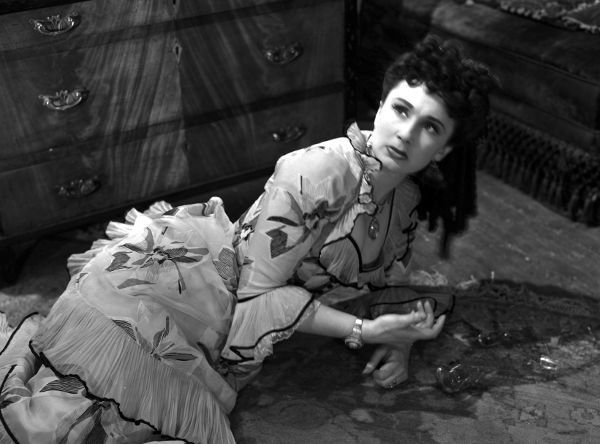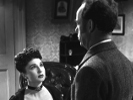Eye For Film >> Movies >> Pink String And Sealing Wax (1945) Film Review

Pink String and Sealing Wax sound like an unlikely combination and this debut feature from Robert Hamer, who would go on to direct comic masterpiece Kind Hearts And Coronets, is filled with odd bedfellows in terms of its narrative - with clashes between classes and generations - and in terms of its direction, which delivers a not always successful mix of black comedy and high melodrama. Despite its sometimes curious tone, it is, as film lecturer Melanie Williams rightly points out in one of the excellent extras accompanying this restored release, deserving of praise for its foregrounding of women - unusual for Ealing Studios - and for its rock solid central performance from Googie Withers.
Although ostensibly set in Victorian era Brighton, there's little doubting that the class and gender issues highlighted in the film were equally hot topics at the time Diana Morgan adapted Ronald Petrwee's play for the big screen, giving the film an extra resonance. The title refers to the seals put on medicine in Mr Sutton's chemist's shop, a dusty establishment run by the stiff and domineering Sutton (Mervyn Johns), who rules his family with a rod of iron. This means he disapproves of his daughter Victoria (Jean Ireland) showing an inclination to pursue a singing career, and frowns upon her constant refusal to marry, while pouring scorn on his son David (Gordon Jackson as a mere slip of a lad and with barely a trace of Scots brogue), telling him he is too young for romance.

As if to underline Sutton's unpleasantness, he also keeps guinea pigs on the verge of starvation - the cad! - setting him at odds with his youngest daughter. As a result, his whole family carry on behind his back, a situation which results in David's path crossing that of wily local landlady Pearl (Withers), who longs to be free of her equally domineering drunk of a husband. David is an innocent abroad, falling for Pearl's charms and failing to see she is only interested in him to the extent of making her lover Dan (John Carol) jealous, and its clear his strychnine small talk can only lead to poisonous results.
A subplot involving Victoria's desire to break free from her father's grip is little more than a damp squib as Hamer's interest lies in both the cynical assessment of Victorian - and by extension, the post-war period - patriarchy and in the melodrama it offers. Pearl may be murderous but Morgan's script shows she is caught between a rock and a hard place, the only way to escape being the death of her husband, while Sutton, in stark counterpoint, cheerfully points out to his wife that any money she once brought to their union is now owned solely by him. In fact, all the men of the older generation conspire to generate sympathy for Pearl and the other women who pepper the narrative, particularly Dan, whose interest in the landlady is purely fiscal. Some light relief is offered by Victoria's plot to get a singing scholarship, but Hamer's focus is firmly on the melodrama as Pearl begins to set her plans in motion, rising to a tense climatic 'money shot' that Withers milks to the full. Despite being uneven, this is worth seeing for Withers' full-blooded performance and its delightfully cynical scenes that skewer notions of idyllic Victorian family life.
Reviewed on: 19 May 2016


















